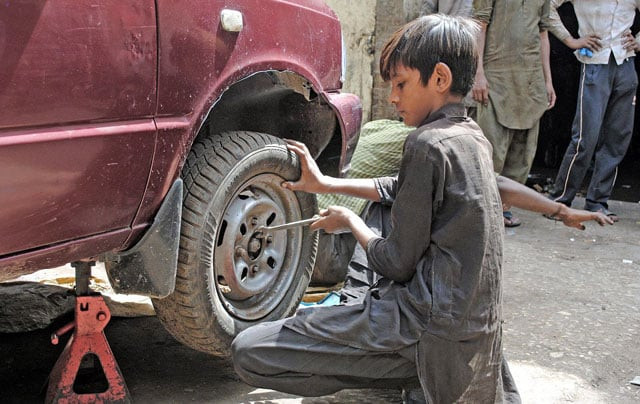New survey highlights gaps in implementation of labour laws
Pakistan and India the only countries which have the minimum age for hazardous work set as 14 years instead of 18

Pakistan, along with India, is the only country which has the minimum age for hazardous work set as 14 years instead of 18 years. PHOTO: INP
As the world celebrated Decent Work Day on October 7, a new survey revealed urgent need for countries including Pakistan to implement and uphold existing laws to address labour issues.
Called the Decent Work Survey, the global review of national labour laws was conducted by University of Amsterdam’s WageIndicator Foundation and covers 35 indicators in 131 countries.
The data helps Pakistani employees compare their work conditions with the international labour standards and how they are applied in the country. Though Pakistan is on the right track in terms of labour legislation, an assessment of the 35 indicators reveals unique trends such as low minimum age for hazardous work and no provision for ‘equal pay for equal work’ or for breastfeeding breaks.
“Pakistan, along with India, is the only country which has the minimum age for hazardous work set as 14 years instead of 18 years; the country also has no law to promote non-discrimination in employment-related matters,” said Iftikhar Ahmad, a labour law expert at WageIndicator Foundation.
Ahmad heads the Pakistan team of the foundation. His team also found out Pakistan does not have any unemployment benefit system nor any law which requires equal pay to women workers for work of equal value.
The legal expert, however, shared Pakistan was among one of the few countries in the world which provide both civil remedies as well criminal penalties in the case of sexual harassment. “This must be appreciated,” he said, also pointing out Pakistan has 12 weeks of maternity leave while in USA, there was no statutory provision on paid or unpaid maternity leave. The evaluation of the labour legislation further revealed Pakistan was among those countries which provide highest compensation for overtime (151-200%).
With 131 countries providing legislation to protect workers against inhumane labour practices, the bigger test is of compliance and implementation of those laws. International Labour Organization’s (ILO) Country Director for Pakistan Francesco d’Ovidio said the country was progressing quite well in adopting laws but there were many gaps and challenges in implementation.
Ahmad also added that apart from not having independent laws on occupational safety, health and non-discrimination, Pakistan lacks appropriate inspection services. “The implementation situation is quite weak and the government needs to reform its labour inspection system by not only hiring more labour inspectors but also bringing more transparency in the labour market,” Ahmad stressed.
He said since devolution of labour matters to provinces, labour rights in Pakistan have deteriorated. “Federal governments elsewhere in the world set a minimum standard to be followed by federating units but this did not happen in Pakistan; under the devolution plan, now every province has the right to enact its own legislation and there is a race towards the bottom with no genuine reforms implemented,” he said.
The ILO country director agreed certain provinces were doing better than the others and mentioned Punjab and Balochistan as making significant efforts in ending child and forced labour. He assured Pakistan was serious in its intentions to address these issues.
On lack of clear law on ‘equal pay for equal work’, d’Ovidio stated it was one of the major issues to address. He also shared that the government has requested ILO to come up with a formula to decide ideal minimum wage. “Minimum wages are not decided objectively and the government has asked for our input to make this fair,” he said.
In agreement with WageIndicator Foundation and ILO country director’s assessment, Human Rights Commission of Pakistan’s (HRCP) legal adviser Mehboob Khan said implementation of the laws was the real task at hand and that it was the state’s responsibility to ensure compliance.
Published in The Express Tribune, October 10th, 2015.



















COMMENTS
Comments are moderated and generally will be posted if they are on-topic and not abusive.
For more information, please see our Comments FAQ